Personal viability GULL partnership
Personal Viability (PV) training prepares people with a full set of skills for life, November 2008
Are you viable?
Personal viability: Training for life
“If we give you fish, we feed you for one day. If we teach you how to fish, we feed you for life.” Personal viability training prepares people for life and to play a full role in sustainable economic development by equipping participants with the skills (character and competence) needed to be self-reliant and financially independent. This is a unique approach – especially in developing nations where the short term quest for food, water, money, shelter and other resources tends to be the focus.
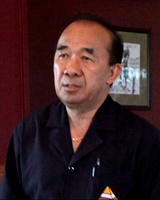 Donor agencies have historically focused their resources and attention on the development projects – they want to see something tangible in return for the investments made. This approach is unlikely to succeed if the individuals with responsibility for the various development projects have not undergone development themselves beforehand. The Personal Viability programme addresses this need.
Donor agencies have historically focused their resources and attention on the development projects – they want to see something tangible in return for the investments made. This approach is unlikely to succeed if the individuals with responsibility for the various development projects have not undergone development themselves beforehand. The Personal Viability programme addresses this need.
Samuel Tam MBE, CSI, OL, Founder of the Personal Viability programme & Chairman of EDTC.
A new partnership for holistic human development
A global GRASSROOTS university is now a reality!
On Wednesday 12 November 2008, the Global University for Lifelong Learning (GULL) & Entrepreneurial Development Training Centre Ltd (EDTC) agreed to work together to provide holistic development via EDTC’s ‘Personal Viability’ (PV) programme and GULL professional certification.
This partnership offers all people of the world an opportunity to obtain a Government recognized university degree at an affordable cost.
The GULL/EDTC collaboration also means that probably for the first time in history, Christians everywhere can obtain a professional degree for actualizing the Bible. For those of other faiths, the teachings of all major religions are actualized by PV training which encourages participants to pursue WISDOM.
PV-GULL aims to equip and empower the low paid, the disadvantaged and the poorest … globally …

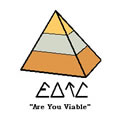 (Left) The GULL logo – ‘Enabling YOU to make a difference in OUR world’.
(Left) The GULL logo – ‘Enabling YOU to make a difference in OUR world’.
(Right) ‘Are you viable?’ EDTC’s holistic human development training enables participants to develop the confidence, character and competence to be self-reliant and financially independent.
About EDTC and Personal Viability
Entrepreneurial Development Training Centre Ltd., (EDTC) is a training institution registered under the Investment Promotion Authority and the National Training Council of Papua New Guinea. EDTC is also Franchisor of the highly innovative and successful Personal Viability (PV) Training Programme. Launched in 1996, PV provides holistic training and enables participants to develop themselves into valuable human assets in support of their families and communities. PV’s Patron is Sir Paulias Matane (who is also GULL’s founding Chancellor).
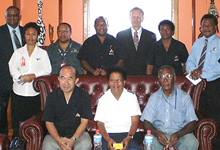 PV was developed in PNG by Samuel Tam, and it is now operating in other countries too. Its purpose is to encourage participants to develop thinking skills, good character, rich habits and competence so as to enable them to realize their full potential and contribute more fully to family, community and national economic development.
PV was developed in PNG by Samuel Tam, and it is now operating in other countries too. Its purpose is to encourage participants to develop thinking skills, good character, rich habits and competence so as to enable them to realize their full potential and contribute more fully to family, community and national economic development.
Pictured: EDTC and GULL briefing session (front left, seated) Samuel Tam founder of PV.
The PV-GULL launch event: 12 November 2008
PV’s aim is to enable the people of PNG and other Nations that adopt the PV programme (some 20,000 students since 1996) to become fully self-reliant and financially independent. EDTC provides the content, structure and curriculum for grassroots development and an EDTC PV Grading system to measure good character & competence. GULL provides a system and process for action learning, tracking and recognizing outcomes and for certifying personal and professional attainment (linked to the PV Grading system).
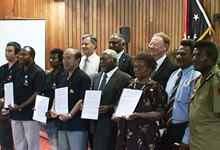 Pictured: The PV-GULL Memorandum of Understanding (MOU) and guests at the launch event held in the State Function Room, National Parliament House, Port Moresby, PNG.
Pictured: The PV-GULL Memorandum of Understanding (MOU) and guests at the launch event held in the State Function Room, National Parliament House, Port Moresby, PNG.
The MOU was witnessed by Sir Paulias Matane, Head of State. Guests included leaders from the Church, The PNG Defence Force, Diplomats and other dignitaries.
Holistic human development and PV:
In pursuit of wisdom and genuine wealth
The aim here is to profile the innovative features of Personal Viability (PV) a training programme for life, and to show the linkages with professional certification awarded by the Global University for Lifelong Learning (GULL).
 To explain the nature of the challenge, imagine a table with a pile of cash on one side and a machine for printing money on the other side. If offered a choice, those who struggle financially will always choose the cash option – and when the cash has gone, they are back to square one. PV focuses on helping people to use and understand the machine – not merely a cash machine but the human mind.
To explain the nature of the challenge, imagine a table with a pile of cash on one side and a machine for printing money on the other side. If offered a choice, those who struggle financially will always choose the cash option – and when the cash has gone, they are back to square one. PV focuses on helping people to use and understand the machine – not merely a cash machine but the human mind.
Samuel Tam, Founder of the Personal Viability programme.
Wealth resides in the human mind – and it is accessible if we learn to use what we have all been given by the Creator.
Developing character & competence:
PV: Training for life
In PV, we focus on how to use key resources more effectively.
These are: (1) time and (2) money (the economy discipline).
In our view, competence relates to the ability to convert resources into assets – and without these skills, it is difficult to make money. The first account to develop is ‘Goodwill’ which is based on love and talent (‘heart of gold’). The more goodwill you develop, the better the financial prospects will be because it follows the universal law of success (e.g. You reap what you sow, Give to receive).
Next is ‘Integrity’ in the form of honesty and trust – like goodwill, this is intangible and we define this as ‘words of gold’. You must do what you say you are going to do – otherwise people will not trust you.
Shown below, these relationships are depicted in terms of ‘Earthly wealth’ (left side) and ‘Heavenly wealth’ (right side). Experience indicates that people with the necessary ‘character’ rarely have the ‘competence’ to succeed and vice versa. The purpose of PV is to address the problem of poverty by developing these skills.
Developing character and competence
Tangible Wealth |
Intangible Wealth |
|---|---|
|
|
EDTC’s experience indicates that people with the necessary ‘character’ rarely have the ‘competence’ to succeed and vice versa. The purpose of PV is to address the problem of poverty by developing these skills.
Implementing PV:
PV: Training for life
The best way to teach people who have not had prior educational and development opportunity is to use and play games. Participants enter PV training (the ‘Game of life’) and the ‘Game of life’ reflects the overarching purpose of PV. It doesn’t matter where you live in the world because these rules apply to everybody.
Next we introduce the ‘Game of money’. It is important because most people in the developing world have not been taught how to play this game and they have no idea where the goal posts are – the main reason why they don’t score. Our purpose here is to teach financial literacy – in action.
The ‘Game of money’ is man-made, but it is very effective as it operates in a similar way to the ‘Parable of the Talents’ used by Jesus to illustrate good stewardship. To illustrate, we recently finished playing a game of money in Port Moresby, Papua New Guinea. We gave each team of between 5 and 10 participants 100 Kina and seven days later, one team came back with 1,000 Kina and the other team came back with more than 700 Kina.
After this, participants enter the PV ‘Home School’ stage so that they can prepare a family needs audit and implement a family needs master plan.
After creating the master plan, participants implement it by re-playing the game of money over a sustained period of time so as to enable them to attain the necessary financial resources needed to support their family (as appropriate to their own specific family needs).
This is a key PV assignment and the Home School is designed to enable participants to implement the PV training principles and attain this goal. It is the action part of the programme that involves the whole family, supported by a PV coach who encourages and supports the participants.
The implementation process takes the form of relevant education (like marketing) and building on reflections from taking action and reviewing the outcomes. The goal of PV is for every participant to purchase their own family house and establish some form of income generating project. To achieve this target, participants must aim to raise a 30 percent deposit (on a house purchase) by playing the ‘game of money’.
To illustrate, if the total needed to purchase a house and to establish a family income generating project is 100,000 Kina, the participant must generate a 30 percent deposit (30,000 Kina) and the EDTC team (for PV) will organize a bank loan on behalf of the participant for the balance of the sum needed (70 percent) and assign a PV coach to supervise the participant until the PV loan has been re-paid.
Four stages of PV learning:
PV: Training for life
To verify the outcomes of PV, a detailed grading system is used. This reflects four stages of PV learning and attainment. The PV grading system is also interlinked with the professional certificates, diplomas and degrees awarded by GULL.
The first stage is UNCONSCIOUS INCOMPETENCE. At this point, most people are unaware that ‘money’ is not the same as ‘wealth’ and although they might be competent in a supply-driven public sector type role, they would not be able to survive in the demand-driven system (industry and commerce).
After attending PV, participants reach the next level: CONSCIOUS INCOMPETENCE and are introduced to the EDTC PV grading system. In ascending order, it features four levels: Provisional, Bronze, Silver and Gold.
The PV Entrepreneurial Development Training Centre (EDTC) is designed to assist participants to develop their own competence and character to Provisional and Bronze levels using the tools (e.g. house purchase and income generating project) outlined in ‘Implementing PV’ (slides 9-12 inclusive).
The development process does not focus on making money per se, but on developing holistic human character and competence.
PV’s projects are ‘people’ and, in attaining Silver level, participants reach a third stage: CONSCIOUS COMPETENCE. Some will progress to Gold level when they attain the fourth and final stage: UNCONSCIOUS COMPETENCE.
In attaining Gold level, PV participants will have developed rich habits. For example, they are always on time (never late) and they are absolutely consistent and reliable in business and other relationships.
Figure 3 shows the PV stages of learning and attainment, interlinked with GULL professional certification. It is anticipated that 100 percent of participants – globally - will complete PV training (GULL B Entry level); Game of Money (GULL B Certificate level) and PV Provisional stage (GULL B Diploma and for those with exceptional scores, Professional Associate degree level). The majority will go on to attain PV Bronze level (GULL Professional Bachelor degree) and some will later reach PV Silver level (GULL Professional Master degree) and even PV Gold level (GULL Professional Doctor degree).
Demand-driven thinking & behaviour:
PV: Training for life
PV focuses on the four stages of learning and its participants (people). In contrast, many organizations focus their resources and attention on the projects – they want to see something tangible in return for the investments made. This approach is less likely to succeed because sustainable development is not possible if the individuals with responsibility for the various development projects have not undergone development themselves beforehand.
For sustainable development (people and projects) it is essential that those who are implementing the projects understand and can cope with the pressures of a demand-driven system (DDS).
There are four key elements to a demand-driven system. First, it is important to recognize that the customer is the boss. Second, we must do the important things first, not the urgent things. Securing ‘money’ is always the urgent thing – but more important is the character and competence of the individuals who are implementing any given project. Third, the system must reward correct behaviour. Unfortunately, in a supply-driven system, incorrect behaviour is often rewarded and unless this mentality changes, it is not possible to develop character and competence. Finally, every Kina (or US dollar etc.) that is invested, must come back in the form of a return on the investment made.
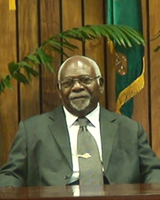 PV-GULL: A dedication to Sir Paulias Matane
PV-GULL: A dedication to Sir Paulias Matane
Thank you Sir Paulias!
The PV-GULL leadership would like to thank Sir Paulias Matane for supporting our work and facilitating this partnership. Sir Paulias is a visionary leader with a passionate concern for the low paid, the disadvantaged and the poorest.
Sir Paulias Matane, Head of State, Papua New Guinea, Founding Chancellor, GULL Patron, Personal Viability
GULL is a not-for-profit foundation registered in California, USA. GULL is recognized by the Government of Papua New Guinea & endorsed by other Governments, Leaders & Institutions.
- Download Article - PDF
November, 2008
Personal Viability (PV) training prepares people for life and to play a full role in sustainable economic development by equipping participants with the skills (character and competence) needed to be self-reliant and financially independent. The PV team has trained more than 20,000 people since its inception in 1996 and now in partnership with GULL (as PV-GULL) participants earn GULL’s professional certificates, diplomas and degrees (as appropriate) when they achieve the related PV grading scheme levels (Provisional, Bronze, Silver and Gold)..